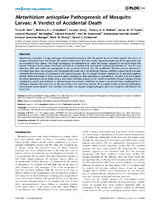Mostrar el registro sencillo del ítem
Metarhizium anisopliae Pathogenesis of Mosquito Larvae: A Verdict of Accidental Death
| dc.contributor.author | Butt, Tariq M. | |
| dc.contributor.author | Greenfield, Bethany P.J. | |
| dc.contributor.author | Greig, Carolyn | |
| dc.contributor.author | Maffeis, Thierry G.G. | |
| dc.contributor.author | Taylor, James W.D. | |
| dc.contributor.author | Piasecka, Justina | |
| dc.contributor.author | Dudley, Ed | |
| dc.contributor.author | Abdulla, Ahmed | |
| dc.contributor.author | Dubovskiy, Ivan M. | |
| dc.contributor.author | Garrido-Jurado, Inmaculada | |
| dc.contributor.author | Quesada-Moraga, Enrique | |
| dc.contributor.author | Penny, Mark W. | |
| dc.contributor.author | Eastwood, Daniel C. | |
| dc.date.accessioned | 2013-12-23T11:31:36Z | |
| dc.date.available | 2013-12-23T11:31:36Z | |
| dc.date.issued | 2013 | |
| dc.identifier.uri | http://hdl.handle.net/10396/11526 | |
| dc.description.abstract | Metarhizium anisopliae, a fungal pathogen of terrestrial arthropods, kills the aquatic larvae of Aedes aegypti, the vector of dengue and yellow fever. The fungus kills without adhering to the host cuticle. Ingested conidia also fail to germinate and are expelled in fecal pellets. This study investigates the mechanism by which this fungus adapted to terrestrial hosts kills aquatic mosquito larvae. Genes associated with the M. anisopliae early pathogenic response (proteinases Pr1 and Pr2, and adhesins, Mad1 and Mad2) are upregulated in the presence of larvae, but the established infection process observed in terrestrial hosts does not progress and insecticidal destruxins were not detected. Protease inhibitors reduce larval mortality indicating the importance of proteases in the host interaction. The Ae. aegypti immune response to M. anisopliae appears limited, whilst the oxidative stress response gene encoding for thiol peroxidase is upregulated. Cecropin and Hsp70 genes are downregulated as larval death occurs, and insect mortality appears to be linked to autolysis through caspase activity regulated by Hsp70 and inhibited, in infected larvae, by protease inhibitors. Evidence is presented that a traditional hostpathogen response does not occur as the species have not evolved to interact. M. anisopliae retains pre-formed pathogenic determinants which mediate host mortality, but unlike true aquatic fungal pathogens, does not recognise and colonise the larval host | es_ES |
| dc.format.mimetype | application/pdf | es_ES |
| dc.language.iso | eng | es_ES |
| dc.publisher | Public Libray of Science (PLOS) | es_ES |
| dc.rights | https://creativecommons.org/licenses/by-nc-nd/4.0/ | es_ES |
| dc.source | PLoS ONE 8 (12) (2013) | es_ES |
| dc.subject | Metarhizium anisopliae | es_ES |
| dc.subject | Dengue | es_ES |
| dc.subject | Yellow fever | es_ES |
| dc.title | Metarhizium anisopliae Pathogenesis of Mosquito Larvae: A Verdict of Accidental Death | es_ES |
| dc.type | info:eu-repo/semantics/article | es_ES |
| dc.relation.projectID | info:eu-repo/grantAgreement/EC/FP7/282767 (INBIOSOIL) | es_ES |
| dc.rights.accessRights | info:eu-repo/semantics/openAccess | es_ES |

